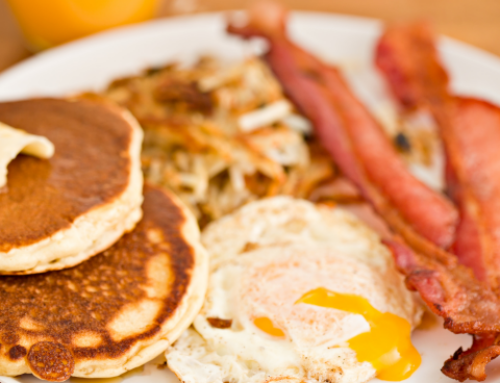The Great Burger Battle: Which One Is Best for Athletes?
Times have changed. Burgers used to come from cows, end of story. Nowadays, many different types of meat (and meat substitutes) are slapped on buns and called burgers. So which one is right for you?
STACK spoke with Leslie Bonci, director of sports nutrition at the UPMC Center for Sports Medicine and dietician for the Pittsburgh Steelers, to get the lowdown on six types of burgers and to figure out which one is best for athletes. The winner will be crowned STACK’s Great Burger Battle Champion.
Here are the contestants:
Regular Ground Beef Burger
(4 oz., 80 percent lean)
Calories: 306
Fat: 20g
Saturated Fat: 7.5g
Protein: 29g
The 80-percent-lean beef burger (four-fifths lean meat, one-fifth fat) is the standard variety at barbecues and corner restaurants everywhere. We all know and love this burger, but it’s not without issues. Bonci says, “The biggest issue with regular ground beef is its high fat and saturated fat content.” This burger is high in protein, but all that fat and saturated fat could give your 6-pack some extra insulation.
RELATED: How to Build a Tasty, Healthy Cheeseburger
Lean Ground Beef Burger
(4 oz., 95 percent lean)
Calories: 193
Fat: 7.5g
Saturated Fat: 3.5g
Protein: 29.5g
Like the standard beef burger, but better for you. Lean beef is slightly more expensive than regular beef (about an extra $1.50 per pound), but it’s definitely worth it. Bonci says, “When choosing ground beef, always go with 95 percent lean, 5 percent fat.” The difference in terms of nutritional value is staggering. A 4-oz. 80-percent-lean beef burger contains more than twice as many grams of fat and saturated fat as the 95-percent-lean burger, and 113 more calories. Choose the lean burger to trim the fats without sacrificing that precious protein.
Veggie Burger
(4 oz.)
Calories: 104
Fat: 1g
Saturated Fat: 0g
Protein: 18g
The veggie burger constitutes a popular alternative to the standard beef burger for both vegetarians and people who are calorie-conscious. With the lowest total calories, grams of fat and grams of saturated fat, and the least amount of protein, the veggie burger makes sense if you are trying to lose weight and cut down on body fat. Aside from that, its relatively low protein content makes it less than ideal for athletes. Here’s an easy recipe for a lentil burger.
Turkey Burger
(4 oz.)
Calories: 180
Fat: 9g
Saturated Fat: 2.5g
Protein: 21g
You may ask, what is a turkey burger? Is it some sort of John Madden-inspired creation involving burger meat inside a turkey? As awesome as that sounds, a turkey burger is actually just a burger made from ground turkey meat instead of ground beef. Turkey burgers can be viewed as a compromise option between beef burgers and veggie burgers. They contain fewer calories than beef burgers but more protein than veggie burgers. They are a fairly smart choice, but the 95-percent-lean burger delivers 8-1/2 more grams of protein with only a few more calories. Check out a few more easy ground turkey recipes.
Bison Burger
(4 oz.)
Calories: 227
Fat: 9.5g
Saturated Fat: 5g
Protein: 34.5g
A bison burger, a.k.a. a buffalo burger, is a great nutritional choice for athletes. Made from the meat of the American bison (sorry University of Colorado), they are packed with protein (a 4-oz. serving contains 34.5 grams). Their taste has been compared to a beef burger, but a bit sweeter. Although their calorie, fat and saturated fat content are all second highest in the group, their ultra-high protein content more than makes up for it. However, bison meat is expensive compared to beef and turkey (a pound costs twice as much as a pound of lean ground beef).
Venison Burger
(4 oz.)
Calories: 178.5
Fat: 8g
Saturated Fat: 3.5g
Protein: 34.5g
Venison (deer meat) is very lean and a good source of protein. To appreciate the nutritional value of venison, compare it to another protein-rich food, peanut butter. To get the same amount of protein in a 4-oz. serving of venison, you would have to eat three servings of peanut butter, which would total 564 calories, 48 grams of fat and 10 grams of saturated fat. The only drawbacks are that venison can be hard to find, and depending on its preparation, it may have a gamey taste.
The Wild Card: Iron
Bonci says, “Iron content is important to preventing anemia [lower-than-normal red blood cell count, which produces feelings of weakness and fatigue] and also to assist with good bone health.” Factoring in iron content gives an advantage to ground beef, bison and venison burgers, since they have far more iron than turkey burgers and veggie burgers. Here’s how you can add iron to any burger.
The Winner: Lean Ground Beef
Like all true champions, the winner of the Great Burger Battle, lean ground beef, is well-balanced: high in protein and iron but low in fat, saturated fat and calories. If price were not a consideration, the protein-packed bison burger might have knocked the 95-percent-lean beef option off the throne. But bison’s exorbitant price gives the edge to the lean ground beef burger.
Finally, it’s worth noting that the above nutritional values apply only to the burger patties themselves. The bun you choose and the toppings you place on your burger can dramatically change its nutritional profile. Bonci says, “A burger is only as good as what you do or do not put on it or have with it. A burger loaded with mayo and cheese, or accompanied by a huge serving of fries and a large soda, is not a performance-enhancing meal.”
RECOMMENDED FOR YOU
MOST POPULAR
The Great Burger Battle: Which One Is Best for Athletes?
Times have changed. Burgers used to come from cows, end of story. Nowadays, many different types of meat (and meat substitutes) are slapped on buns and called burgers. So which one is right for you?
STACK spoke with Leslie Bonci, director of sports nutrition at the UPMC Center for Sports Medicine and dietician for the Pittsburgh Steelers, to get the lowdown on six types of burgers and to figure out which one is best for athletes. The winner will be crowned STACK’s Great Burger Battle Champion.
Here are the contestants:
Regular Ground Beef Burger
(4 oz., 80 percent lean)
Calories: 306
Fat: 20g
Saturated Fat: 7.5g
Protein: 29g
The 80-percent-lean beef burger (four-fifths lean meat, one-fifth fat) is the standard variety at barbecues and corner restaurants everywhere. We all know and love this burger, but it’s not without issues. Bonci says, “The biggest issue with regular ground beef is its high fat and saturated fat content.” This burger is high in protein, but all that fat and saturated fat could give your 6-pack some extra insulation.
RELATED: How to Build a Tasty, Healthy Cheeseburger
Lean Ground Beef Burger
(4 oz., 95 percent lean)
Calories: 193
Fat: 7.5g
Saturated Fat: 3.5g
Protein: 29.5g
Like the standard beef burger, but better for you. Lean beef is slightly more expensive than regular beef (about an extra $1.50 per pound), but it’s definitely worth it. Bonci says, “When choosing ground beef, always go with 95 percent lean, 5 percent fat.” The difference in terms of nutritional value is staggering. A 4-oz. 80-percent-lean beef burger contains more than twice as many grams of fat and saturated fat as the 95-percent-lean burger, and 113 more calories. Choose the lean burger to trim the fats without sacrificing that precious protein.
Veggie Burger
(4 oz.)
Calories: 104
Fat: 1g
Saturated Fat: 0g
Protein: 18g
The veggie burger constitutes a popular alternative to the standard beef burger for both vegetarians and people who are calorie-conscious. With the lowest total calories, grams of fat and grams of saturated fat, and the least amount of protein, the veggie burger makes sense if you are trying to lose weight and cut down on body fat. Aside from that, its relatively low protein content makes it less than ideal for athletes. Here’s an easy recipe for a lentil burger.
Turkey Burger
(4 oz.)
Calories: 180
Fat: 9g
Saturated Fat: 2.5g
Protein: 21g
You may ask, what is a turkey burger? Is it some sort of John Madden-inspired creation involving burger meat inside a turkey? As awesome as that sounds, a turkey burger is actually just a burger made from ground turkey meat instead of ground beef. Turkey burgers can be viewed as a compromise option between beef burgers and veggie burgers. They contain fewer calories than beef burgers but more protein than veggie burgers. They are a fairly smart choice, but the 95-percent-lean burger delivers 8-1/2 more grams of protein with only a few more calories. Check out a few more easy ground turkey recipes.
Bison Burger
(4 oz.)
Calories: 227
Fat: 9.5g
Saturated Fat: 5g
Protein: 34.5g
A bison burger, a.k.a. a buffalo burger, is a great nutritional choice for athletes. Made from the meat of the American bison (sorry University of Colorado), they are packed with protein (a 4-oz. serving contains 34.5 grams). Their taste has been compared to a beef burger, but a bit sweeter. Although their calorie, fat and saturated fat content are all second highest in the group, their ultra-high protein content more than makes up for it. However, bison meat is expensive compared to beef and turkey (a pound costs twice as much as a pound of lean ground beef).
Venison Burger
(4 oz.)
Calories: 178.5
Fat: 8g
Saturated Fat: 3.5g
Protein: 34.5g
Venison (deer meat) is very lean and a good source of protein. To appreciate the nutritional value of venison, compare it to another protein-rich food, peanut butter. To get the same amount of protein in a 4-oz. serving of venison, you would have to eat three servings of peanut butter, which would total 564 calories, 48 grams of fat and 10 grams of saturated fat. The only drawbacks are that venison can be hard to find, and depending on its preparation, it may have a gamey taste.
The Wild Card: Iron
Bonci says, “Iron content is important to preventing anemia [lower-than-normal red blood cell count, which produces feelings of weakness and fatigue] and also to assist with good bone health.” Factoring in iron content gives an advantage to ground beef, bison and venison burgers, since they have far more iron than turkey burgers and veggie burgers. Here’s how you can add iron to any burger.
The Winner: Lean Ground Beef
Like all true champions, the winner of the Great Burger Battle, lean ground beef, is well-balanced: high in protein and iron but low in fat, saturated fat and calories. If price were not a consideration, the protein-packed bison burger might have knocked the 95-percent-lean beef option off the throne. But bison’s exorbitant price gives the edge to the lean ground beef burger.
Finally, it’s worth noting that the above nutritional values apply only to the burger patties themselves. The bun you choose and the toppings you place on your burger can dramatically change its nutritional profile. Bonci says, “A burger is only as good as what you do or do not put on it or have with it. A burger loaded with mayo and cheese, or accompanied by a huge serving of fries and a large soda, is not a performance-enhancing meal.”











